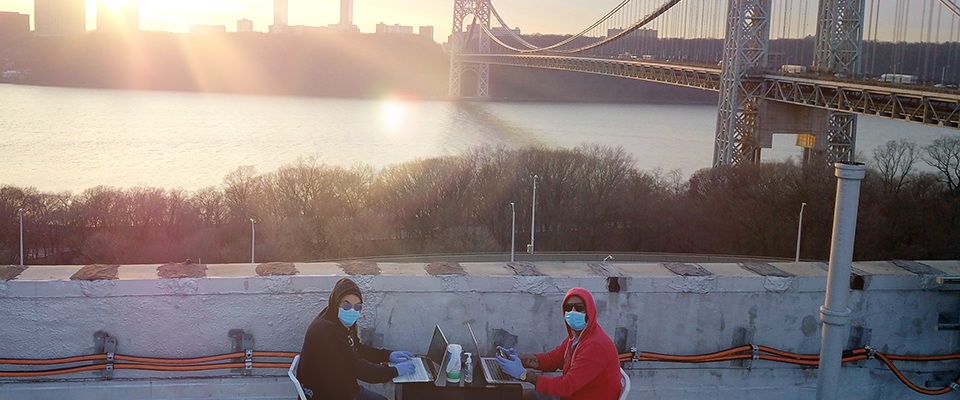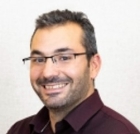You are here

Carrying on with the Mission
Dr. Cyril Eleftheriou, with contributions from Drs. Julia Kaiser, Paola Bianchimano and Carlo Corona
The current global pandemic of COVID-19 has thrown the world of research upside down, with many multi-million dollar studies put on PAUSE, experimental animal colonies decimated, time-sensitive reagents wasted and carefully designed experiments stopped in their midst. The consequences are far reaching and can feel very frustrating for everybody in the medical research field, from patients to scientist. Despite these obstacles, research scientists around the world, including us researchers at the Burke Neurological Institute, are still carrying on with “The Mission” to conduct the science hope demands. Experiments are only a single facet of medical research, scientists carry out a number of other intellectually intense, time-consuming activities that we can focus on even in times of a PAUSE in experimentation.
Staying on top of the literature
Being an expert in the existing knowledge of any discipline is a herculean task in itself, but medical research constantly churns out a huge amount of new knowledge. Moreover, most of our research is multi-disciplinary and thus we need to learn about fields that may be closely or distantly related to our fields of expertise. Under normal circumstances, weekly seminars given by experts of different fields and conferences to connect with our peers are a great way of staying in the loop, allowing us to absorb a great deal of knowledge in short periods of time. Most of these have now, understandably, been cancelled to help flatten the curve with social distancing. This gives us ample opportunities to catch up on literature, a task that often is given secondary priority in our daily life, using channels such as PubMed, Google Scholar or even bioRxiv to discover newly published projects. To catch up on current research chatter, social media has become more and more important in all research fields. Twitter has become a great resource to discover new research and directly discuss this with experts, peers and authors.
Data analysis
In order to make sense of the complex biological data-sets we gather in our experiments, an incredible amount of effort is required to analyze and present these in scientifically rigorous and up to date ways. The down-time in our experimental work allows us now to focus on analyzing the data that was newly acquired before the PAUSE and to push our experiments on this front. Additionally, this provides an opportunity to re-analyze old data with new ideas and ways, or even new techniques to compare various analyses.
Networking
Networking allows us to interact with other people in the field, brainstorming together to come up with new ideas and to establish vital collaborations. In this period of work in self isolation, it is important to turn to the digital world. Scientists can meet new people via twitter, email authors of relevant studies directly, or comment on newly-released bioRxiv articles. Also, this is a great time to maintain existing connections with previous mentors and mentees and to already start planning attendance/organizing events for 2021 and 2022. With a tendency to relocate to different time-zones and perform experiments at antisocial hours, research scientist often neglect to spend time with family and friends, an essential for having a balanced personality (and thus optimized analytical skills). The current pandemic may allow us to reconnect with our loved ones, which will allow us to maintain a healthy work life balance and might reduce potential mental health issues often seen in the STEM research field.
Writing: Papers and grant applications
In academic research, the principal motto has always been “Publish or perish”. To this end, applying for grants is an important step to assure funding for the planned experiments. This may include fellowships, studentships, travel grants, etc. All of these are highly competitive and require a large amount of thought and writing. By putting our efforts into applying for grant in these times, we can secure funding for important experiments that we can start when our life has been un-paused and we will bring our work force back into the lab space.
Skill improvement
A large amount of skills and techniques are required to rigorously conduct our experiments and shape them into a form that will help other scientists. Some of these may be procedural (learning to use a technical equipment) and can only obtained in a lab environment from a competent teacher, while others are digital (like coding or biostatistics) and may be acquired from trusted sources over the internet. For example, Coursera is a fantastic resource for digital learning with courses from respected professors at top universities around the world and is completely free of charge. Datacamp to learn coding also come highly recommended.
In our daily life as a scientist, we are trying to balance these tasks simultaneous to our experimental procedures, which is a challenging task in itself. More often than not, experiments take up the vast majority of available time in any given week, overshadowing all other facets of research. Even though scientists all over the world are now forced to put their experiments on PAUSE, impairing our abilities to push the boundaries of science, there are still a myriad possibilities we can and WILL seize to carry on the mission to help patients of neurological disorders.




